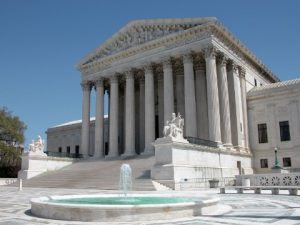 Yesterday on the blog of quantitative legal analysis site The Juris Lab, contributor Ross Guberman posted the results of a review of briefs filed with the U.S. Supreme Court during October Term 2019. Mr. Guberman sought to quantify, through the use of AI-generated algorithms, whether “elite” High Court practitioners (attorneys identified as such by Chambers & Partners, Law360, etc.) are more effective advocates than other attorneys that authored Term 2019 merits-stage party or amicus briefs.
Yesterday on the blog of quantitative legal analysis site The Juris Lab, contributor Ross Guberman posted the results of a review of briefs filed with the U.S. Supreme Court during October Term 2019. Mr. Guberman sought to quantify, through the use of AI-generated algorithms, whether “elite” High Court practitioners (attorneys identified as such by Chambers & Partners, Law360, etc.) are more effective advocates than other attorneys that authored Term 2019 merits-stage party or amicus briefs.
The analysis found that 25% of the “non-elites” scored above the average for “elite” briefs. We’re proud to note that Washington Legal Foundation’s amicus brief in Atlantic Richfield Co. v. Christian, et al. was among those 25%. Former Senior Litigation Counsel Corbin Barthold authored the Christian brief for WLF.
WLF’s brief earned high praise from Atlantic Richfield’s Counsel of Record in Christian, Williams & Connolly LLP’s Lisa Blatt, who Chambers & Partners ranks as a “Band 1” Supreme Court practitioner. When informed of The Juris Lab’s ranking, Lisa responded,
“This brief was so terrific and effective because it grabbed the reader at hello with easy to understand analogies, and was clear, simple, and a fun read.”
In its April 20, 2020 ruling, the U.S. Supreme Court reversed a Montana Supreme Court ruling that allowed private landowners to impede the EPA’s efforts to clean a large hazardous-waste site. Federal law blocks states or private parties from interfering with the EPA-directed cleanup of such a site.
